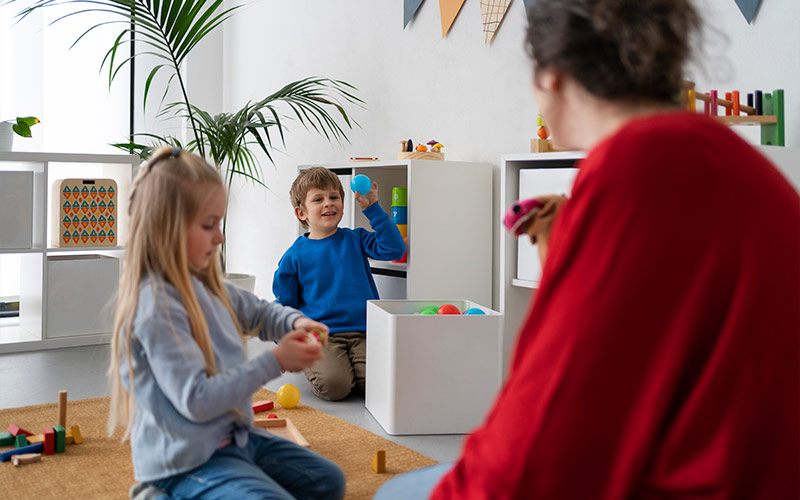Why Child-Centered Play Therapy?
Children engage in play naturally, exploring their world, learning new skills, and expressing themselves creatively. But did you know that play can also be a powerful tool for healing and growth? Child-centered play therapy is a therapeutic approach that harnesses the power of play to help children process difficult emotions, develop social skills, and improve their mental health.
TL;DR:
Child-centered play therapy uses the natural act of play as a therapeutic tool to help children process emotions, build social skills, and improve mental health. Guided by principles such as child-led play, empathy, unconditional acceptance, and confidentiality, this approach creates a safe space for children to express themselves freely. Benefits include reduced anxiety and depression, better emotional regulation, improved self-esteem, and stronger communication skills. It is effective for children facing challenges like trauma, behavioral issues, grief, or learning difficulties, with research supporting its success. Qualified therapists trained in this method provide structured yet flexible sessions to foster healing and growth.
Empower your child with play therapy in Brooklyn, NY. Schedule now!

What is Child-Centerd Play Therapy and How Can It Help
Child-centered play therapy is based on the belief that children possess the innate capacity to heal and grow through play. This therapeutic approach creates a safe and supportive environment where children can play freely and express themselves without restrictions. As the child plays, the therapist observes and guides, helping the child explore their emotions, thoughts, and behaviors.
Principles of Child-Centered Play Therapy
Several principles guide child-centered play therapy:
- Child-Directed: The child controls their play, choosing activities and how they engage with them.
- Empathy: The therapist strives to understand and accept the child’s experiences and emotions.
- Unconditional Positive Regard: The child is accepted for who they are, without judgment or conditions.
- Confidentiality: What happens in the therapy room remains confidential unless the child is in danger.
Benefits of Child-Centered Play Therapy
Child-centered play therapy offers numerous benefits, including:
- Improved Mental Health: Helps reduce anxiety, depression, and stress.
- Enhanced Social Skills: Facilitates communication, cooperation, and conflict resolution.
- Boosted Self-Esteem: Increases confidence and self-assurance.
- Strengthened Emotional Regulation: Teaches healthy identification, understanding, and expression of emotions.
Who Can Benefit from Child-Centered Play Therapy?
This approach can benefit children of all ages with various issues, such as:
- Anxiety
- Trauma
- Behavioral Problems
- Depression
- Learning Difficulties
- Grief
- Relationship Problems
The Child-Centered Play Therapy Process
A typical session lasts between 30-60 minutes. The child has access to various toys, games, and art materials. The therapist observes the child’s play and provides guidance as needed. They may join in the play or simply offer a safe space for the child to play freely.
Research and Evidence Supporting Child-Centered Play Therapy
Research supports the effectiveness of child-centered play therapy. Studies have shown its efficacy in treating various mental health concerns in children, leading to improvements in mood, behavior, and social skills.
Finding a Qualified Child-Centered Play Therapist
When considering child-centered play therapy, finding a qualified therapist is crucial. Look for a therapist with experience working with children and specialized training in child-centered play therapy. Recommendations from pediatricians, mental health professionals, or local mental health organizations can be helpful.
Child-Centered Play Therapy: A Powerful Approach for Healing and Growth
Child-centered play therapy is a powerful approach that can help children heal and grow. Through play, children can explore their emotions, develop social skills, and improve their mental health. If your child faces emotional or behavioral challenges, child-centered play therapy can be an excellent option.
Key Takeaways
- Child-centered play therapy uses play as a therapeutic tool to help children process emotions, build social skills, and improve mental health.
- The approach is based on the belief that children have an innate capacity to heal and grow when provided with a safe, supportive environment.
- Core principles include child-directed play, empathy, unconditional acceptance, and confidentiality.
- Benefits include reduced anxiety and depression, improved emotional regulation, stronger self-esteem, and enhanced communication and social skills.
- It is effective for children dealing with issues such as anxiety, trauma, behavioral problems, depression, learning difficulties, grief, and relationship challenges.
- Sessions typically last 30–60 minutes and involve toys, games, and art materials, with therapists guiding or observing play.
- Research supports its effectiveness in improving mood, behavior, and social functioning in children.
- Choosing a qualified therapist with specialized training and experience is essential for success.
